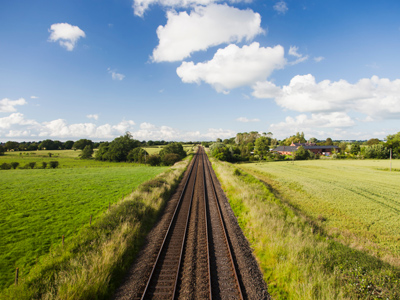
Ask the AI Tutor
Need help with Britain 1815-1851 - The Railways? Ask our AI Tutor!
AI Tutor - Lucy
Connecting with Tutor...
Please wait while we establish connection

Britain had 7,000 miles of railway by 1850.
Britain 1815-1851 - The Railways
Steam railways transformed Britain in the 1800s. This GCSE History quiz looks at new lines, faster travel, Railway Mania, and how trains reshaped work, trade, and everyday life.
1 .
Which of the following did not become a major railway centre during the nineteenth century?
Swindon
Crewe
Rugby
Bedford
With the railways themselves came railway centres - towns where factories and workshops grew, making and repairing locomotives, wagons, carriages and the like
2 .
What is the importance of William Huskisson in the history of Britain's railways?
He was the first government minister to ride on a train
He was the first person to be killed by a train
He was the first cabinet minister to be responsible for rail transport
He insisted that passenger trains did not exceed 10 m.p.h.
Huskisson was a politician who took an early interest in railways. He liked to be present at the unveiling of new lines and it was at one such occasion that he was run over by a train
3 .
Stephenson's gauge for his track was fixed at 4 feet 8 inches. What name was given to this gauge?
Default gauge
Common gauge
Standard gauge
Normal gauge
Other widths were tried but Stephenson's original measurement stood the test of time. It is used still throughout the world today
4 .
At which Central London railway terminus was a fine classical arch erected in 1837?
Marylebone
Paddington
Waterloo
Euston
The arch was a major feature of this station until the mid-twentieth century, when it was demolished
5 .
How many miles of railways did Britain have (to the nearest 500) by 1850?
3,000
9,000
4,500
7,000
The huge growth in railways in Britain by 1850 is remarkable given the paucity of tracks only twenty years before
6 .
Which two cities were connected in 1830 when the first inter-city line to use steam locomotives was opened?
Stockton and Darlington
Liverpool and Manchester
Coventry and Birmingham
Leeds and Bradford
After this ceremony railway building in Britain proceeded apace
7 .
What nickname was conferred on George Hudson on account of his dominating position in the railway industry during the middle of the nineteenth century?
The Rail King
The Railway King
The King of the Tracks
The Rail Tsar
Hudson was a businessman rather than an entrepreneur. Eventually he became mired in allegations of fraud
8 .
"God's Wonderful Railway" was the nickname of one of the companies that emerged during the nineteenth century. What was its proper name?
Great Wessex Railway
Great Western Railway
Great Welsh Railway
Great Wiltshire Railway
The nickname stuck, for the track was a wonder of modern engineering
9 .
Which railway engineer and entrepreneur designed and built the 2 mile long Box Tunnel in Wiltshire on the line between Swindon and Bristol?
Robert Stephenson
Richard Trevithick
Isambard Kingdom Brunel
Nigel Gresley
This line was a major engineering achievement, with many tunnels, bridges, embankments and cuttings
10 .
At the famous Rainhill Trials in 1829 Stephenson's entry won. What was the name of this locomotive?
Missile
Rocket
Patriot
Minuteman
Winning this race gave a real boost to Stephenson's career and he began to plan further railway enterprises
You can find more about this topic by visiting BBC Bitesize - Industrial Britain and the people's health, c.1750-c.1900
**Unlimited Quizzes Await You! 🚀**
Hey there, quiz champ! 🌟 You've already tackled today's free questions.
Ready for more?
Ready for more?
🔓 Unlock UNLIMITED Quizzes and challenge yourself every day. But that's
not all...
not all...
🔥 As a Subscriber you can join our thrilling "Daily Streak" against other
quizzers. Try to win a coveted spot on our Hall of Fame Page.
quizzers. Try to win a coveted spot on our Hall of Fame Page.
Don't miss out! Join us now and keep the fun rolling. 🎉
**Unlimited Quizzes Await You! 🚀**
Hey there, quiz champ! 🌟 You've already tackled today's free questions. Ready for more?
🔓 Unlock UNLIMITED Quizzes and challenge yourself every day. But that's not all...
🔥 As a Subscriber you can join our thrilling "Daily Streak" against other quizzers. Try to win a coveted spot on our Hall of Fame Page.
Don't miss out! Join us now and keep the fun rolling. 🎉






